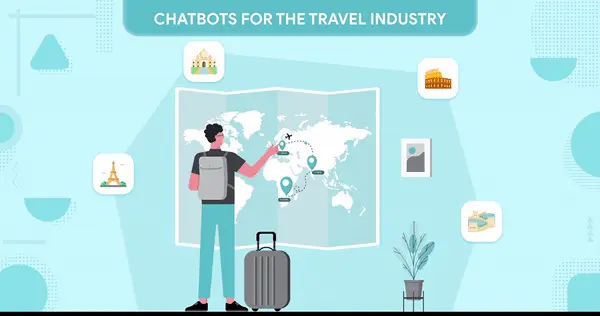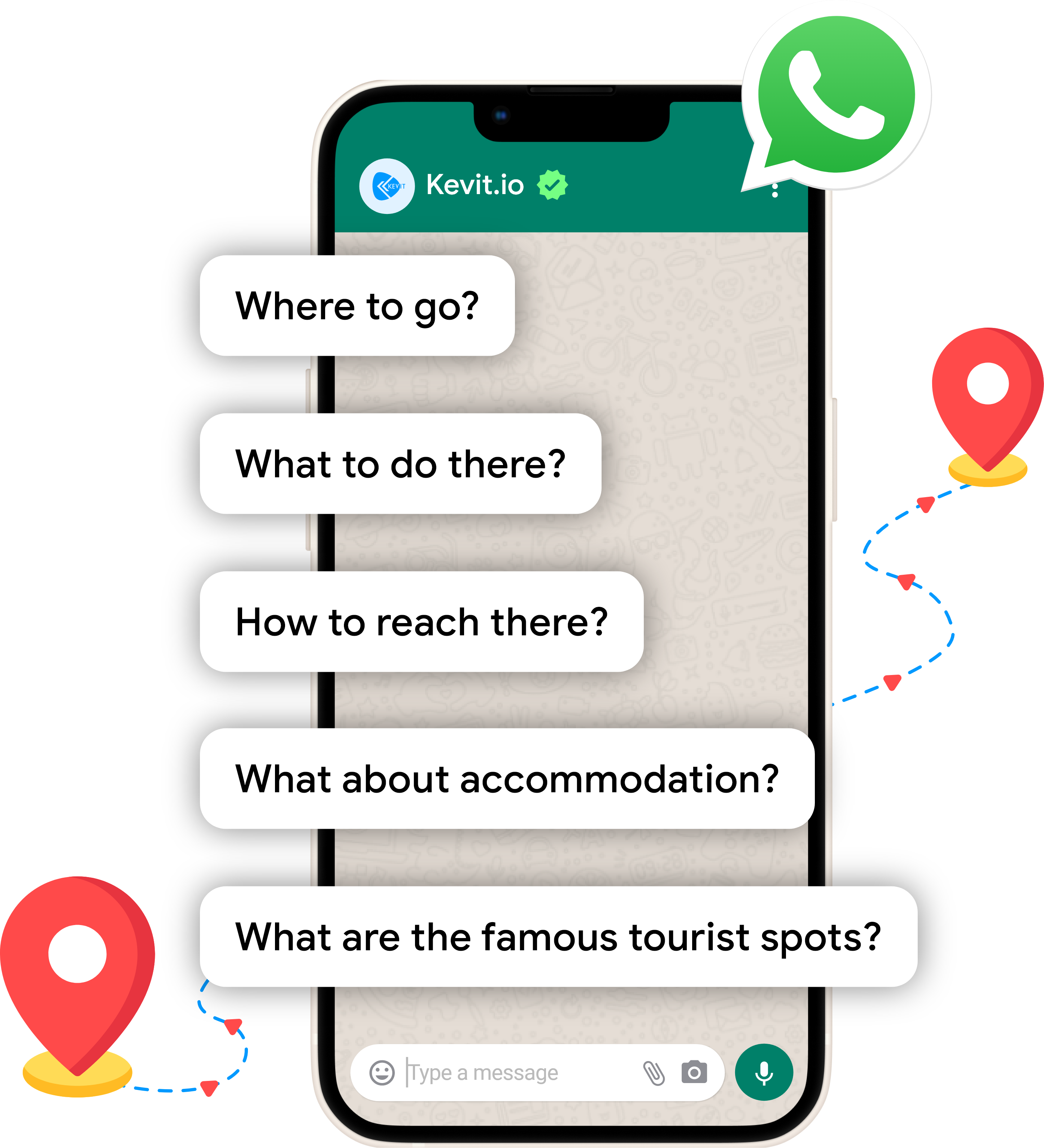Chatbots For Travel Industry

- December 24, 2021
- Priyanka Shah
- Travel
As beautifully quoted by Stephen Covey that- “Live your life by a compass not a clock.” But that can be quite a task for travelers as it requires meticulous planning and despite the best efforts of the travel industry, not always a delightful one.
Planning leads to the list of frequently asked questions that’s going to bombard your mind:

These are just a few mentioned ones from the array of questions that travelers think of. Now the answers to all these questions are scattered all over the Internet or else you must depend on someone’s recommendations. While both the options are dubious, there’s a way where all your questions can be/ are answered.
The only solution can be Conversational AI:
TRAVEL CHATBOT
In addition to the bustling sectors like Ecommerce, Healthcare, and Banking, the Travel Industry has also undergone a shift from manual processes to automated chatbots. The digital revolution has significantly disrupted the travel business, evident through online bookings, automated check-ins, and digital travel guides.
What are travel chatbots?
Travel chatbots are automated virtual assistants or software programs designed to interact with travelers and assist them throughout various stages of their journey replacing customer support team. These chatbots are typically integrated into messaging platforms like websites, apps, or messaging apps such as WhatsApp, Facebook Messenger, and more. They use natural language processing (NLP), machine learning and artificial intelligence (AI) technologies to understand and respond to users’ inquiries and requests in a conversational manner. Pro-active assistance with a chatbot for booking airlines, hotel rooms, car rental, monument & park tickets is trending due to its anytime availability and ease of access.
There’s a lot that chatbot can do to make life easier for customers and travel service providers alike.
Why businesses in the travel industry need chatbots ?
Travel chatbots offer a range of functionalities to enhance the travel experience as mentioned below:
Seamless Trip Planning
Travelers can be navigated through the complete trip planning journey using WhatsApp chatbots. By gathering details regarding preferences like book a hotel or select an appropriate place, budget, and travel dates, these chatbots can propose customized itineraries, lodging selections, and activity options. This personalized support elevates the user experience and facilitates travellers in making well-informed choices. Moreover, WhatsApp bots are adept at assisting travelers in identifying the most best deals as well.
On-the-go Helper
One of the key advantages of integrating WhatsApp chatbots in the travel industry is their round-the-clock availability. Travelers often have questions and concerns at any time of day, regardless of time zones. Chatbot can provide instant assistance, from querying about flight details to asking for recommendations on local attractions.
Real Time Updates and Notifications
Keeping travellers informed about any changes or updates is crucial. WhatsApp chatbot can help send real-time notifications about flight delays, gate changes, weather forecast alerts, and more. This proactive communication minimizes inconveniences and builds trust between travellers and travel companies.
Data-Driven Insights
Travel business can use Chatbots gather data about user interactions and preferences. This data can be analysed to identify trends, customer behavior, and areas for improvement. These insights can guide marketing strategies, product development, and overall business decisions.
Cost Saver
WhatsApp Chatbots excel at managing a substantial amount of customer interactions simultaneously, thereby diminishing the necessity for an extensive customer service agents and curbing operational expenditures. They can proficiently navigate customers through self-service alternatives like flight and hotel reservations, car rentals, and independent transaction completion. Through the automation of responses to L1 and L2 inquiries, simple chatbot can contribute to an impressive reduction in support expenses, potentially reaching up to 80% in cost savings.
Upsell and Cross Sell
WhatsApp Chatbot can suggest additional services like upgrades, or add-ons that align with travellers’ preferences which will ultimately lead to increased revenue opportunities for the travel companies.
Reduce Booking Abandonments
Implementing a chatbot for your travel agency can effectively decrease booking abandonments and boost in-app payments. This, in turn, minimizes the necessity for users to switch back and forth between various websites for comparison. By enabling payments within the application, the likelihood of payment opt-outs is reduced, leading to heightened security. Additionally, the travel business can send well-timed reminders to users who haven’t finalized their payments, significantly increasing the probability of efficient conversion.
Use-cases of Chatbots for the Travel Industry:
Customer engagement and personalization are becoming increasingly important in the travel industry. Chatbots are a great way to provide an enhanced customer experience, offering travelers personalized service when they need it.
1. Effortless booking and reservations
Using a chatbot enables travel agencies to streamline the booking process, allowing them to securely book airline tickets, hotels, tours, and activities directly via the chat interface. This obviates the necessity to navigate diverse websites or apps, thereby enhancing the convenience and user-friendliness of the booking experience. Consequently, this approach aids users in advancing through the sales funnel and close a deal.
2. Reach out to potential leads
In the current landscape, both major and minor travel enterprises grapple with a primary challenge: acquiring qualified leads. In an increasingly competitive market, generating leads that align with their services proves to be a formidable task. Yet, WhatsApp offers a potential avenue for garnering promising leads and guiding them through the conversion process handled by a bot. Businesses can initiate Click-to-WhatsApp Ads and Campaigns, seamlessly attracting audiences from social media platforms like Facebook and Instagram to WhatsApp. Intrigued individuals can then engage in discussions via chatbots, obtaining relevant information to aid their decision-making.

3. Marketing campaigns
The WhatsApp chatbot can be employed to initiate and manage personalized marketing interactions with potential customers. This can include sending tailored travel offers, providing real-time assistance, and answering inquiries promptly. By leveraging the chatbot’s capabilities, travel agencies can enhance customer engagement, deliver targeted promotions, and ultimately increase the likelihood of converting leads into bookings by sending marketing messages within the application. This approach not only streamlines the marketing process but also enhances the customer experience by offering seamless and convenient communication directly through the WhatsApp platform.
4. Engage customers at every mile
Through the examination of user data and previous engagements, WhatsApp chatbots possess the capability to present tailored suggestions for upcoming travel endeavors. Whether it involves proposing destinations founded on past travel experiences or suggesting comparable activities, these insights contribute an element of customization that resonates with travelers. Deliver seasonal promotions, individualized travel recommendations via a chatbot can foster customer loyalty as it gives them one-to-one personalized engagement. Companies can use linked CRM databases to conversations by incorporating user preferences and interests.
5. Feedback & FAQs
The travel bot plays the role of connecting travelers with the travel company, effectively enabling a smooth and productive feedback loop. The insights gathered via the chatbot’s interactions provide the company with the tools to implement strategic enhancements, thereby enhancing the quality of their services and cultivating more robust customer connections. In essence, the interactions facilitated by chatbots after a trip empowers travel companies to access the invaluable viewpoints of their clients, thereby fostering a positive cycle of progress and innovative ideas.
Benefits of using Chatbots for Travel Industry:

Features of Travel Chatbot:
1. Chatbot Sensitivity
User-friendly and personalized chatbots make sures better customer support, making space for greater opportunities for companies to generate leads through chatbots. For example, in case of GReaTa, chatbot utilized by GRT Hotels & Resorts exchanged over 175,000 messages within 2.5 months of its launch. This resulted in:
- 84% people shared their contact details after communicating with the chatbot
- 40% of the customers had booking intent
2. Chatbot’s prompt responses
Chatbots are known for their readiness and instant responses with round the clock availability. These same abilities of bot across different communication channels, with hand over facility to a live agent if needed is what is the reason behind the success of travel chatbots. When around 50% customers expect businesses to be online 24*7, real time responses are of utmost importance.
Along with the waiting time, what matters is how engaging the chatbot is. Monotonous conversations will drive away leads because of boredom. So, it’s necessary to have chatbots that understand and use human humour.
Here’s where Conversational AI plays its part.
3. Reliability
How much a customer can rely on a chatbot depends on its capabilities of Natural Language Processing and Understanding and its deep learning based on each customer interaction. Having an up-to-date training dataset about travel prices, destinations, packages, and comparisons ensures travel chatbot reliability and makes it a treasure trove of data.
Difference Between an AI Chatbot and a Rule-Based Chatbot
Chatbots are computer programs designed to simulate human conversation.
They can be divided into two main types:
1. AI chatbot
2. Rule-based chatbots
AI chatbot use artificial intelligence to process natural language input and generate responses and can provide more natural conversations than rule-based bots, as they are capable of understanding the context of a conversation and responding accordingly. while rule-based chatbots rely on pre-programmed rules to interpret user input. AI-powered bots could also learn from past conversations and apply that knowledge in future interactions. On the other hand, rule-based chatbots are limited by their pre-defined set of rules, which means they cannot respond dynamically to new inputs or learn from experience. However, these bots are easier to develop than AI bots due to their simpler architecture. In summary, both types of chatbot have distinct advantages and disadvantages; it is up to the developer to decide which type is best suited for their needs.
Kevit.io’s travel chatbot stands out from the crowd to be the best multiplatform and multilingual chatbot with easy integration to your web entity and smart training sessions. This ensures a high satisfactory level in travel enthusiasts who are planning their holidays. Know more about travel chatbots at Kevit.io and mail us at coffee@kevit.io for the same!
Happy and Safe Travelling!😊
See Kevit.io In Action
Automating business processes with Kevit.io is now just a click away!